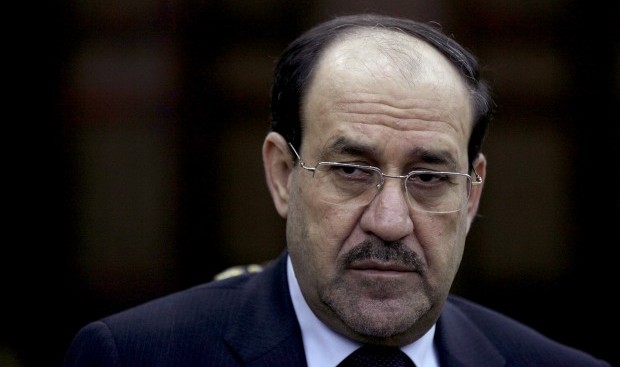“The stance of these two states is very strange,” Iraqi Prime Minister Nuri Al-Maliki remarked in mid-2012, in reference to Qatar and Saudi Arabia. According to him, it was strange that these two countries were providing military, logistic, and humanitarian support to the Syrian people in the face of Bashar Al-Assad’s daily slaughter.
Maliki then rolled up his sleeves in defiance, proclaiming: “It has been one year and the regime did not fall, and it will not fall, and why should it fall?”
Now, in the wake of news reports that the Syrian rebels are being provided with weapons, most recently through an arms shipment from Croatia, the truth is that Maliki’s stance is the one that is strange. He sits on the border with Syria and provides its regime with oil, fuel, and arms. He allows Iranian planes to pass through and provide Assad with anything he asks for. Maliki has never renounced his support of a regime that is committing the gravest massacres of the 21st century, thus he is an accomplice to these crimes. All he has done is voice his surprise towards two states (Saudi Arabia and Qatar) that are seeking to help people who are being killed every day.
The equation in Syria is as follows: The Assad regime is armed to the teeth because of its military-security structure and because it is being openly supported by Iran, Russia, Iraq, and Hezbollah. They provide Assad with funds, weapons, oil, fighters, intelligence, diplomatic data, and propaganda. On the other hand, the oppressed Syrian people have so far received limited support because of closed borders, legal problems, and political caveats. The opposition have armed some of their members, some of whom are army defectors, but the majority are mere citizens defending their neighborhoods. Now, after all the bloodshed, they are still insistent on overthrowing the regime.
We must not forget that the Syrian revolution began peacefully and continued as such for the first four months. However, it was brutally confronted by the Assad regime. Envoys from the world’s superpowers witnessed the revolution’s peaceful nature first-hand when they visited protesting cities such as Hama. Yet after the regime’s troops began to slaughter the innocent demonstrators, it was only natural that the Syrians would resort to arms and defend themselves.
During the past 20 months, rebellion has spread across the country. The regime has responded with warplanes, tanks, artillery, and missiles, bombarding cities and towns. Most of the victims have been civilians. There is no similar case in modern history whereby tanks and warplanes have bombed cities for almost two years without any international organizations doing anything to stop them.
Amid this blood and destruction, the countries and people of the region could not simply watch these calamities unfold on television while having dinner. A few Arab states have adopted critical stances towards the Assad regime; naturally they have rushed to the aid of the Syrian refugees with shelter and blankets. Nevertheless, this is their duty.
We should be very proud of those states that Maliki referred to as “strange”, because they are helping millions of Syrians defend themselves and deter the regime’s troops who are committing massacres nearly on a daily basis. Had the UN intervened and imposed a no-fly zone, this support would not have been required. Had Assad accepted a political solution, these “strange” states would have certainly backed this solution.
It is the duty of the Arab governments, and all the governments of the civilized world, to stop any massacre being committed by a state regime. One cannot compare an opposition activist holding a rifle to an entire army using MiG warplanes, Sukhoi fighter jets, and tanks to shell towns and cities.
Maliki once complained that the world was doing nothing with regards to what was happening in southern Iraq during the reign of Saddam Hussein, when the latter’s forces slaughtered rebels for a period of four days. Today, he is criticizing the support being provided for the Syrian people, who have been brutally massacred for almost two years. What happened in Iraq was a crime but the Syrian regime’s atrocities are far graver.
Maliki could have adopted a fair political stance to prove to the Arabs, the Syrians, and his own people first and foremost, that he stands against injustice. This stance could have dispelled the suspicions circling around him and his positions. Yet today Maliki is standing by a regime fighting against 20 million civilians—the majority of the Syrian people. I do not know how he believes that the Syrian regime will not fall.
